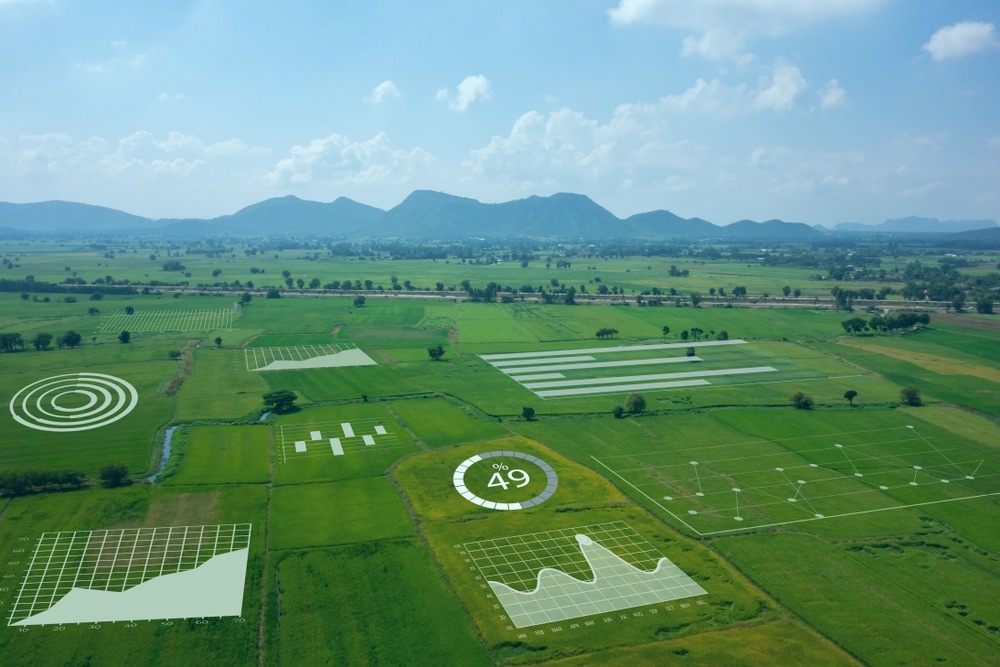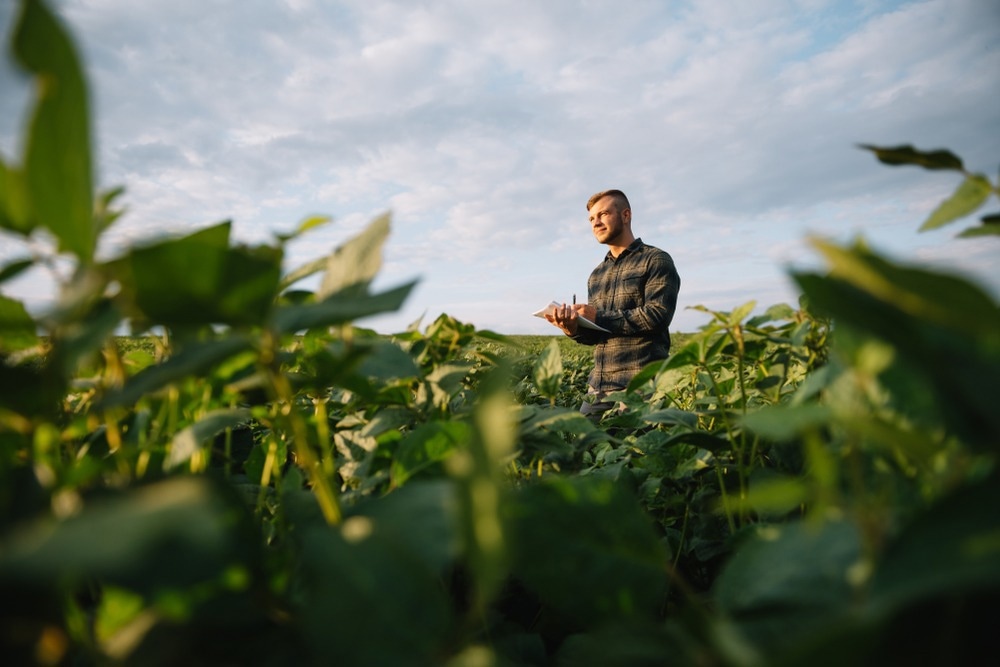Quantum technology has emerged as a transformational tool that can revolutionize the farming industry. Quantum sensing and computing offer superior detection sensitivities and data processing capabilities compared to conventional methods.

Image Credit: MONOPOLY919/Shutterstock.com
Food security is still a concern in the twenty-first century. More robust crops and growing methods are continuously being experimented with and developed.
Technology has made a huge impact in improving farming gains and reduction of overhead costs. Better genetics are being developed through selective breeding to increase the quality and abundance of crops. Fertility impact can be increased by better equipment, fertilizers, and soil management techniques. Weeds and insect contamination can be prevented from impairing productivity by crop protection solutions with more sophisticated chemistry.
While data analytics to improve efficient farming solutions has benefitted from AI, the complexity of simulating systems involving multiple interacting variables is a challenge. Current digital technologies do not possess the computation capacity to carry out complex calculations.
Quantum-enabled technology offers a vastly different computing paradigm than traditional computers. The types of calculations that can be performed on quantum devices are fundamentally different. They work particularly well for the investigation of extremely complex systems with many interdependent variables.
In a traditional computer processor, computations are made using the well-known electronic logic gates represented by zeros and ones. Richard Feynman, the Nobel Prize-winning physicist, suggested thirty years ago that to study quantum systems properly, a quantum computer would be ideal. Feynman’s idea has been continuously studied since then. Advancements in scientific equipment like lasers and ultra-high vacuum technology have accelerated the growth of quantum computing and other impactful quantum technologies in the last decade.
The behavior and characteristics of a quantum system are defined by quantum mechanics. For instance, an atom’s energy levels are quantized. These quantum states of atoms or molecules can be electronic, magnetic, or vibrational levels. Quantum coherence is another property of quantum mechanics. This explains how quantum states can sustain their wave-like superposition across time while withstanding interference from the outside world. Another quantum mechanical characteristic that describes a quantum object is quantum entanglement. When two or more particles get entangled, they acquire identical quantum properties independent of their distance from one another.
Quantum Computing
Unlike a MacBook or desktop PC, which divides information into binary bit values of 1s and 0s, a quantum computing processor would examine information in a different way. The quantum representation of a bit is called a "qubit," which resides in a superposition state between 0 and 1 throughout processing and can influence the state of other qubits through entanglement despite being physically apart from one another.

Image Credit: Hryshchyshen Serhii/Shutterstock.com
To comprehend the quantum advantage in processing, there are 8 million different conceivable arrangements of the 23 chromosome pairs in humans, and these chromosomes can hold thousands of genes. There are over 70 trillion potential allele combinations for only one of those genes. The estimated 30,000 genes in our genome make any attempt to quantify the number of conceivable combinations impossible on a conventional computer. Quantum computers can perform such tasks within minutes.
With such computing power, farming could be vastly improved. As an example, In the case of plants, crossbreeding promises to offer varieties and better crop yields. But to see if the new variation displays any improvement in yield and drought resistance, gene combinations have to be trialed and the performance monitored to produce a statistically significant sample. Even then, assessments such as whether its performance might not have been due to stronger genetics but rather to a more advantageous position in the field must also be accounted for. The entire procedure can take up to five to seven years.
Bypassing crossbreeding and directly identifying the genes in charge of crucial features is now a possibility thanks to quantum computing. Then, a new variety with the necessary features may be created using potent genetic editing techniques. These can be fast-tracked into the trial stage. All of this can be accomplished much faster on a quantum machine.
Quantum Sensing
When a quantum system is used to detect small changes in a physical quantity, quantum sensing is established. Any of the aforementioned quantum characteristics can be used for detection. Quantum coherence, quantum entanglement, or quantum states can all be used to monitor changes in a physical quantity precisely.
The kind of quantum technology platform needed will depend on the physical parameter that a quantum sensor responds to. For instance, trapped ions will make an excellent probe for detecting electric fields because they are charged particles. Neutral atoms-based quantum sensors can measure gravity very accurately at a given location.
Gravimetry makes use of atoms that are laser-cooled and fall freely inside a vacuum tube. Atom interferometry is used to calculate acceleration using the matter wave property of quantum particles. Through the detection of minute changes in gravity, quantum sensing and measurement would enable the mapping of intangible subsurface features, such as various soil types and water resources. Knowledge of the interior and surrounding land structure and chemical makeup is invaluable to efficiently using farming resources.
Outlook
While quantum technology is still sprouting at its early stages of growth, it has the potential to increase the productivity and efficiency of farms. According to some experts, hybrid machines that mix conventional and quantum processing will be available within the next decade, greatly enhancing agricultural capabilities. The quantum future promises to help farmers achieve the production increases they need to win the fight for food security.
More from AZoQuantum: A New Algorithm Allows Quantum Computers to Perform Faster Prime Factorization
References and Further Reading
Byrum, J. (15 June 2021) Quantum computing’s answer to the global food security problem. [Online] agfundernews.com. Available at: https://agfundernews.com/quantum-computing-answer-to-the-global-food-security-problem
Swayne, M. (28 December 2022) Quantum Fields: Iowa Congressman Pushes For Quantum Tech in Agriculture. [Online] thequantuminsider.com. Available at: https://thequantuminsider.com/2022/12/28/quantum-fields-iowa-congressman-pushes-for-quantum-tech-in-agriculture/
Wright, J; Kieft, H. and von Diest, S. (2017) Quantum-Based Agriculture: the Final Frontier. Innovative Research for Organic 3.0 - Volume 1: Proceedings of the Scientific Track at the Organic World Congress 2017, November 9-11 in Delhi India ISBN: 978-3-86576-177-4 DOI: 10.3220/REP1510907717000
Disclaimer: The views expressed here are those of the author expressed in their private capacity and do not necessarily represent the views of AZoM.com Limited T/A AZoNetwork the owner and operator of this website. This disclaimer forms part of the Terms and conditions of use of this website.